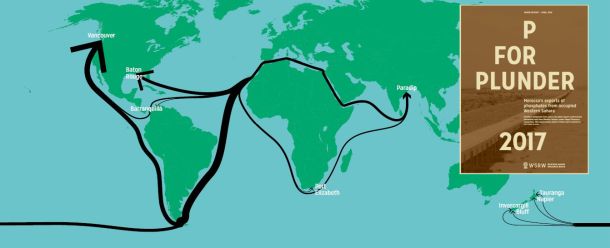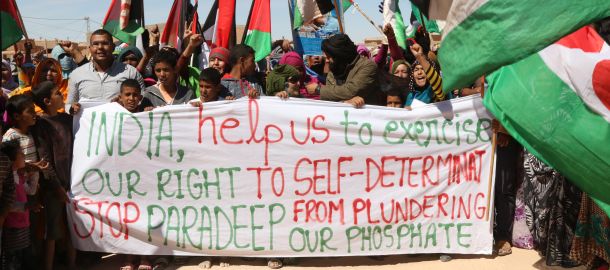Florida fertilizer company Mosaic Co. has received another vessel of phosphates from occupied Western Sahara, in violation of international law. Western Sahara Resource Watch section Florida has urged the company to stop its imports. Read letter here.
After a short delay, the bulk vessel Ocean Twins arrived Tampa, Florida, on 9th of October 2008, with phosphates from occupied Western Sahara. The Panama registered vessel has IMO number 9302906, and docked at Manatee County Port Authority, Berth number 6.
Considering that the vessel has 31.699 dead weight tonnes, the vessel contained an estimated volume of around 30.000 tonnes of phosphates from the Bu Craa mines in El Aaiun. With an estimated value of 425 dollars/tonne of phosphate when the shipment was done, Mosaic can have paid Moroccan authorities around 12,7 million USD for the shipment.
They have done this despite the fact that Morocco does not own the phosphates that has been exported. The phosphate belongs to the neighbouring country, Western Sahara, which is under Moroccan occupation. Such trade is illegal accoring to international law. The UN states that such trade is in violation of international law.
When the shipment arrived Tampa, Western Sahara Resource Watch section Florida sent the below letter to Mosaic Co. Download the letter in pdf here. We have still not received an answer.
Mr. James T. Prokopanko,
The Mosaic Company
Atria Corporate Center
Suite E490
3033 Campus Drive
Plymouth
MN 55441
USA
Open letter to Mosaic
Florida, 7th October 2008
Regarding Mosaic's phosphate shipment from occupied Western Sahara
Dear Mr. Prokopanko, President and Chief Executive Officer of Mosaic,
It has come to our attention that Mosaic is involved in phosphate shipment from occupied Western Sahara. On Wednesday the 8th of October 2008, the ship Ocean Twins and its highly controversial phosphate cargo arrived at Port Manatee close to Tampa Bay. This shipment will be used in Mosaic’s phosphate facilities in Florida.
We would like to underline that trade with and transportation of mineral resources from occupied Western Sahara is highly unethical and politically controversial.
As you know, Morocco is an illegal occupying power in Western Sahara. The Sahrawi population remaining in areas under Moroccan occupation is subjected to grave human rights violations, such as torture, forced disappearances and arbitrary detention. Most importantly, however, they have not been allowed to freely exercise their right to self-determination through a free, fair and transparent referendum. This right was established through UN General Assembly resolution 1514 (XV) (1960), and has since been supported by more than 100 UN resolutions.
The occupation of Western Sahara has resulted in enormous suffering and deprivation for the Sahrawi people, the rightful owners of the land and the natural resources of Western Sahara.
Approximately 165,000 Sahrawis are languishing in refugee camps in the inhospitable Algerian desert since 1975. A May 2008 report by Norwegian Church Aid (NCA) notes that 19% of children living in the Sahrawi refugee camps in Algeria are suffering from malnourishment. Just for comparison, the percentage among children in Darfur is 16%.
Ocean Twins was, according to our information, carrying around 30.000 tonnes of phosphates from occupied Western Sahara. Since 1 tonne is worth around 425 dollars, the value of the cargo is 12,7 million dollars. This money is given directly from Mosaic to the Moroccan state phosphate company. It equals more than 1/3 of all multinational aid given to the refugee camps in the entire 2007 (through WPF, ECHO, UNHCR)!
In light of the above facts, other corporate entities have responded appropriately. Yara, the world's biggest fertilizer company, terminated the imports of phosphate to Norway in 2005, for ethical reasons[i].
"Now that we understand the issue we will not directly contract any more business out of there," said vice-president of the Chinese shipping company Jinhui Shipping to South China Morning Post on 11th of May 2008, after it had been discovered they had carried out a shipment with phosphate from occupied Western Sahara to New Zealand [ii].
In addition to ethical concerns, companies involved in the phosphate trade from occupied Western Sahara should be aware that the trade is most probably in violation of international law. The International Court of Justice in its 1975 Western Sahara Advisory Opinion established that Morocco has no legal claim to Western Sahara. That same opinion affirmed that the Sahrawi population has a right to self-determination, which includes, inter alia, the right of permanent sovereignty over its natural resources. Permanent sovereignty over natural resources is a customary principle of international law [iii]. Numerous resolutions of The United Nations Security Council and General Assembly and a legal opinion by the former UN Under-Secretary General of Legal Affairs, Mr. Hans Corell on 29 January 2002 affirm this position [iv]. Because the Sahrawis have not been able to exercise their right to self-determination, and because they have not been properly consulted, trade with Morocco of natural resources emanating from Western Sahara is a violation of the Sahrawis' right to permanent sovereignty over their resources.
Morocco's control and exploitation of Western Sahara also hurts the Sahrawis' labor rights and their economic development, something which clearly underlines the legally controversial nature of this trade. According to a report by the French organization France Libertés -Fondation Danielle Mitterrand, the Sahrawis have been systematically marginalized from the phosphate industry in Western Sahara. In 1968, before Morocco took control over the phosphate mines, all 1600 workers in the industry were Sahrawis. Today, 1800 of 2000 workers are Moroccan settlers who have illegally been moved into the territory [v].
The Mosaic phosphate shipment is in the interest of Morocco, an illegal occupier, and clearly lends legitimacy to the illegal Moroccan occupation of the territory. This kind of support makes Morocco less inclined to contribute in finding a solution to the occupation, and makes delaying tactics and attempting to profit from the existing situation more attractive. The phosphate trade in Western Sahara therefore increases the risk of further armed conflict, destabilization and suffering in the region. This increased tension actively undermines the hard work of the United Nations to solve the conflict in Western Sahara.
We hereby appeal to Mosaic to do the same as Yara, Jinhui and other international companies. We urge you to demonstrate your attachment to International Legality, Human Rights and basic standards of Corporate Social Responsibility by reconsidering your involvement in shipping phosphate of Western Sahara origin.
We urge Mosaic to issue a statement that your company intends to no longer ship phosphates from occupied Western Sahara.
We will be more than happy to provide you with any additional information that you may require to study this matter more closely.
Any reply could be sent to Western Sahara Resource Watch section Florida, represented by Mr. David Urnes Johnson, at info@vest-sahara.no.
Sincerely,
David Urnes Johnson
Western Sahara Resource Watch section Florida
[i] See for instance Dagens Næringsliv, 5 July 2005 www.dn.no/forsiden/naringsliv/article547859.ece
[ii] Read South China Morning Post, 11 May 2008, here: www.vestsahara.no/index.php?parse_news=single&cat=49&art=950
[iii] This was recently affirmed by the International Court of Justice in its 2005 judgment of Case Concerning Armed Activities on the Territory of the Congo (Democratic Republic of the Congo v.
Uganda.)
[iv] Read the 29 January 2002 Legal Opinion of the UN Under-Secretary General of Legal Affairs here:
www.arso.org/Olaeng.pdf
[v] See for instance France Libertés, Fondation Danielle Mitterrand, International Mission of
Investigation in Western Sahara, January 2003. www.vestsahara.no/files/pdf/France_Libertes_occupied_2003.pdf
New report: Western Sahara phosphate trade halved
The export of phosphate rock from occupied Western Sahara has never been lower than in 2019. This is revealed in the new WSRW report P for Plunder, published today.
New report on Western Sahara phosphate industry out now
Morocco shipped 1.93 million tonnes of phosphate out of occupied Western Sahara in 2018, worth an estimated $164 million, new report shows. Here is all you need to know about the volume, values, vessels and clients.
New report on contentious Western Sahara phosphate trade
Morocco shipped over 1.5 million tonnes of phosphate out of occupied Western Sahara in 2017, to the tune of over $142 million. But the number of international importers of the contentious conflict mineral is waning, WSRW's annual report shows.
New report on global phosphate trade from occupied Western Sahara
Over 200 million dollars worth of phosphate rock was shipped out of occupied Western Sahara last year, a new report from WSRW shows. For the first time, India is among the top importers.



